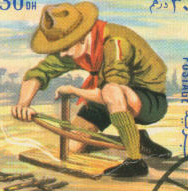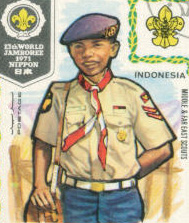| WHAT IS LEADERSHIP? TEN QUALITIES OF LEADERSHIP
LEADERSHIP IS THE PROCESS OF GETTING THINGS DONE BY OTHER PEOPLE. THE QUARTERBACK MOVES THE TEAM TOWARD A TOUCHDOWN. THE SENIOR PATROL LEADER GUIDES THE TROOP TO A HIGH RATING AT A CAMP-O-REE. THE MAYOR GETS PEOPLE TO SUPPORT NEW POLICIES TO MAKE THE CITY BETTER. Ten Tips for Being a Good Patrol Leader
| ||
|
Let's say one of your Patrol members needs help tying a certain knot. What happens if you say something like, "What rank are you? I can't believe you need help with this"! If you don't know how to tie it, tell the truth & help him find someone who does. If you know the knot, don't question his intelligence or abilities-he'll lose his enthusiasm if you do. ARE YOU A BOSS...OR A LEADER?
I have found the above BOSS vs LEADER text to be a neat thing to read during a class early in the course.
That's usually a recipe for the Scout dropping out sooner or later. Considering how much I and you hate to see that happen, I wrote a JLT class that deals with staying focused on advancement and advancement review. I hope it may serve to inspire even one boy to... KEEP YOUR EYE ON THE PRIZE You couldn't wait to advance. Getting your book 'signed off' became an important part of your life. All you could think about was going from one rank to the next OK, SO HOW LONG HAVE YOU BEEN IN SCOUTS NOW? ARE YOU LOSING YOUR FOCUS ON ADVANCEMENT? Why do we do so much ADVANCEMENT REVIEW? If learning certain skills that you don't learn in school is what this is about, why should those skills be reviewed on a regular basis? What helps to make Scouting so unique is that you can review a skill like outdoor cooking and learn a new team-building or leadership skill at the same time. SO PLEASE KEEP YOUR EYE ON THE PRIZE. IT'S COMMON TO GET DISTRACTED AT YOUR STAGE AND IT MAY EVEN GET WORSE NEXT YEAR BUT TRY TO FIGHT IT. AS YOU MOVE ALONG INTO HIGH SCHOOL AND GO THROUGH OTHER CHANGES, IT'S EASY TO LET THINGS GO ON THE BACK-BURNER. LEARN ABOUT THE MERIT BADGES THAT CAN GET YOU ON YOUR WAY. IF YOU DON'T...NO MATTER WHAT...YOU'LL BE DISAPPOINTED LATER THAT YOU DIDN'T LISTEN TO THIS ADVICE. (Try to teach this class with true conviction. Most Scouts at the age of 12 to 14 will agree with you in their hearts. Perhaps if you can convince them that you really do understand their feelings, they just might listen to you) This is a class I modified from an OA Training session that talks about how people may sometimes 'Challenge your Authority'. We're adding this material to our JLT campout. Here it is in its entirety. I hope you find it useful & informative: CHALLENGING YOUR AUTHORITY | Answers to 3 major questions You're not a leader just because you wear a leader's hat or badge of rank. You're a leader when you are getting things done through other people - Leadership is a gift... if you are not born with it, you can't lead. FALSE Leadership does take some skill & not everyone can learn all of the skills as well as anyone else. BUT, most people can learn some of them and develop their own potential. Chances are you weren't born with leadership skills. However, if you can learn to swim, do the math, cook a meal, or fix a bike you can learn leadership skills. Being a leader in a Scout Troop is like being a leader anywhere else- TRUE
Leaders deal with just 2 things-the jobs & the group Leaders, like all people, are different. No leader can take over another leader's job & do it the same way. Groups are different too. A football coach may have trouble leading an orchestra - a Marine drill sergeant may not make a good Scoutmaster. Focus on the group. When a leader changes groups, he changes the way he leads. We lead these JLT classes a little differently than the way we lead the Troop. THE MOST IMPORTANT THING TO DO IS TO TAKE THOSE SKILLS OF LEADERSHIP THAT YOU ARE LEARNING BACK TO YOUR TROOP! BE PREPARED FOR ANY OLD THING Well, it was started by a man who founded the Scouting movement almost 80 years ago. His name was Robert Baden-Powell. He was an English general who took the first Scouts camping back in 1907. He was a most interesting man. Baden-Powell was once asked what the motto meant. What is a Scout supposed to be prepared for? Preparing you for life is what Scouting is all about. We're going to do our best to make you prepared for any old thing.
If you see that a Scout is relying on you for direction or advice then YOU'RE BEING LOOKED UPON AS A LEADER! SEEING THE NEED:
| |


